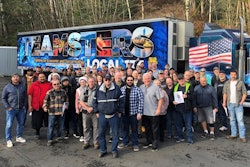As supply chain stakeholders with a genuine interest in the well-being of the trucking industry, each one of us has a responsibility to raise our voice when something isn’t right. With the onslaught of legislative and regulatory action being considered or implemented, sometimes we wonder if anyone is even listening. When we step back and consider the compounding impact of these rules, there is a point where we have to say enough is enough. That may be right now.
On the southern border of the United States, thousands of individuals have been lining up trying to get into this country by any means possible. This is not a new issue and it will likely take some time to resolve the deep-seated issues that surround immigration policy. As a nation, we will continue to debate the balance that takes place between showing empathy for those looking for a better life, increasing the supply of labor, understanding the costs and impacts of unregulated immigration, and maintaining a semblance of law and order. But again, this is not a new issue.
For centuries now, people of all nations have flowed to the borders of this country. So, what is it that draws so many people to want to cross the border and begin a life in the United States? I would guess that there are many reasons, but chief among them would likely be opportunity – the opportunity to exercise freedom; the opportunity to work hard and get ahead; the opportunity to own land; the opportunity to own and operate a business; the opportunity to worship and believe what you want to believe. The list goes on. This is the American Dream. For all the criticism aimed at how imperfect or dysfunctional this country is, people from other countries are still desperately trying to get in. The entire concept of the American Dream is important, and I believe that we have an obligation to protect it.
A recent rule released by the United States Department of Labor (DOL) appears to potentially limit the opportunities for truck drivers to live out their American Dream. The rule changes the definition of an independent contractor by now looking at six factors: (1) the degree of the alleged employer's right to control the manner in which the work is to be performed; (2) the worker's opportunity for profit or loss depending upon their managerial skill; (3) the worker's investment in equipment or materials required for their task, or their employment of helpers; (4) whether the service rendered requires a special skill; (5) the degree of permanence of the working relationship; and (6) the extent to which the service rendered is an integral part of the alleged employer's business.”
As an industry, we are still studying the rule to determine its potential impact. But in any case, the efforts to limit the opportunities for truck drivers to own their own business have been relentless. While this particular rule may not go as far as California’s rule, something tells me that this is not the last step for the DOL. Beginning in California and now at the Federal level, the attacks on our industry are baffling. As you look back at the history of trucking, this is an industry that is critical to the economy of this country. This is an industry that has been a wonderful place for individuals to take some risk, work hard and reap the rewards of that work by owning and operating their own business. Some of the biggest companies on the road today started with a single truck and an owner with a vision.
With the escalating influence of environmental regulations, inflationary equipment costs, rising fuel costs, astronomical insurance costs, threats of nuclear verdicts, trailer pool requirements, load tracking technology and other challenges, independent contractors have been struggling to thrive on their own. That is why many of these individuals have found mutually beneficial affiliations with a fleet to be so helpful. They still own their own truck, pay for their own fuel, select their own loads, carry significant risk, and earn meaningfully more than an employee for taking on those risks. This model has provided thousands of drivers their own version of the American Dream for close to five decades.
One would think that this significant shift in policy that may have a substantial impact on the nation’s supply chain would have come from Congress through legislation. Sadly, this is not the case. It came through a regulatory agency who just decided that it was time for a change. This is not what America is all about. Rather than constricting access to the American Dream, we need to be enabling it. More opportunity, not less. Now is the time to join us by reaching out to your elected representatives and letting them know that this does not work for our industry.
If you have any questions on the recent DOL rule or how to communicate with your local representatives, I encourage you to reach out to TCA Senior Vice President of Safety and Government Affairs, Dave Heller, who can be reached at [email protected].












